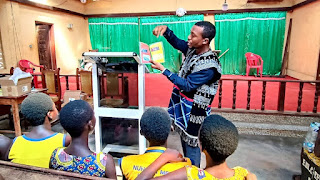 |
| Christian Elongué during a reading workshop at Nungua Methodist School (Ghana), Dec. 2022 |
Awards and literary prizes can encourage or boost literary expression in African languages. Below are few literary prizes and awards worth mentioning, most being from South Africa.
1. The Sanlam Prize for Youth Literature
The Sanlam Prize for Youth Literature is a biennial award initiated in 1980 by Tafelberg Publishing, to develop high-quality literature for teenage readers (ages 12-18) and YA novels in all the South African official languages. The competition is only open to South Africa, Botswana, Lesotho, Namibia, and Swaziland citizens, who submit their writings in one of the six language categories: English, Afrikaans, Tshivenda, Xitsonga, Nguni and Sotho. Prizes worth R90 000 (approx. 5076.07 USD) are up for grabs and prize-winning authors get their books published by Tafelberg Publishers, catapulting their writing career to the next level. The last edition was organised in November 2021.
2. M-Net Literary Awards
M-Net Literary Awards were a group of South African literary awards, awarded from 1991 to 2013. They were established and sponsored by M-Net (Electronic Media Network), a South African television station. In the awards' fourth year, an award for indigenous African languages was inaugurated, alongside the original English and Afrikaans awards, to encourage writing in indigenous languages. Some of the famous winners of these awards included Zakes Mda for Ways of Dying in 1997 and Cynthia Jele for Happiness is a Four-letter Word in 2011.
The award was suspended indefinitely after the 2013 season. The pay TV company cited that the reason they were moving away from literature was that they were re-evaluating its corporate projects. James Murua, a Kenyan literary critic commented that this was very sad when we know that “Big Brother Africa, the scintillating reality show where viewers watch a bunch of folks sit in a house bored out of their wits for three months is still on”.
3. Maskew Miller Longman Literature Awards
The Maskew Miller Longman Literature Awards were established in 2007 by Maskew Miller Longman, an educational publishing company in South Africa, to encourage writing in all of South Africa’s 11 official languages1, with a particular focus on young adult (YA) literature. The genres rotate each year between novels, drama and short stories. Since 2019, with the COVID pandemic outbreak, this literary award has stopped being awarded and we hope it would continue.
As we realize, there are actually few literary prizes that encourage writing stories in African languages. There are other existing literary prizes for children and young adult literature but we have not included them because they were not focusing on works produced in African language. Kpotufe Delali from Muna Kalati, explored five of these prizes for African children's books in French and English and provided 8 recommendations to improve the legitimacy of children's literature through literary prizes in Africa.
Our exploratory analysis reveals that much work needs to be done to see African children reading stories and books in their own languages. Our next article shall present five critical recommendations that could help change the status quo and advance the publishing and availability of more children books in African languages.
***
1 It was the only competition to invite entries in all 11 official languages.
***
This is the third in a series of four posts. Click here for the first and second posts.
Ngnaoussi Elongué Cédric Christian is an author in children literature and researcher on African video games. Dismayed by a lack of black characters in books available to African children, Elongué founded munakalati.org in 2017 with the goal of building international recognition for African children’s book. Christian has supported several researchers to undertake research on African Children literature. In 2019, he authored An Introduction to Children Literature in Cameroon, the first scientific book on children’s book industry in Cameroon. Prior to that, he worked with the French National Centre for Children’s Literature. He serves on the Executive Committee of the International Board on Books for Young People (IBBY International), and is the founding member and Vice-President of IBBY-Cameroon. In 2021, he was one of the 30 Global literacy Champion and innovators by the International Literacy Association and his work on foundational learning and numeracy (FLN), which impacted at least 3032 African children, was covered by LeMonde, RFI, etc. An avid lifelong learner, he holds three master’s degrees on children literature (University Senghor, Alexandria), Instructional Design (University of Lille, France) and in African Studies (University of Dschang) with 46 international certifications from top global universities.
Please note that this author's statements elsewhere regarding the LGBTQ+ community are not in agreement with SCBWI's Statement of Intent on Equity and Inclusion.

No comments:
Post a Comment